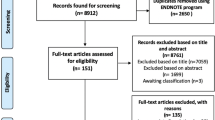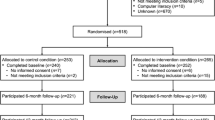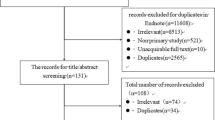Abstract
Purpose
To assess and summarize the effects of informational support on depression and quality of life of older patients with cancer.
Methods
PubMed, MEDLINE, and Web of Science were searched to identify articles written in English and published until March 2021. Studies within 10 years period (2010–2021) were included. Randomized controlled trials were included if they evaluated the impact of informational support on depression and quality of life. All analyses were performed with Review Manager 5.3.
Results
Twelve studies with a total of 2374 participants met the inclusion criteria. Our primary outcomes included depression and quality of life. (1) Depression: results indicated no statistically significant difference and low heterogeneity [SMD = 0.28, 95% CI (− 0.24,0.80), p = 0.45; I2 = 0%], (2) Quality of life: in the subgroup analyses of EORTC QLQ-C30, results indicated a significant effect of informational support on quality of life [SMD = 2.84, 95% CI (0.63, 5.05), p = 0.03; I2 = 79%]; in the subgroup analyses of FACT and SF-36, there were no significance.
Conclusions
Informational support could reduce depression and did improve the quality of life in older cancer patients with statistical significance. The findings suggested that informational support was an effective approach to improve depression and quality of life in older patients with cancer.





Similar content being viewed by others
Data availability
Applicable
Code availability
Revman applicable.
References
Beard JR et al (2016) The World report on ageing and health: a policy framework for healthy ageing. Lancet 387(10033):2145–2154
Gouw V et al (2019) Effectiveness of internal Qigong on quality of life, depressive symptoms and self-efficacy among community-dwelling older adults with chronic disease: a systematic review and meta-analysis. Int J Nurs Stud 99:103378
Balducci L (2019) Geriatric oncology, spirituality, and palliative care. J Pain Symptom Manage 57(1):171–175
Pilleron S et al (2019) Cancer incidence in older adults in selected regions of sub-Saharan Africa, 2008–2012. Int J Cancer 144(8):1824–1833
White MC et al (2019) Cancer risk among older adults: time for cancer prevention to go silver. Gerontologist 59(Suppl 1):S1–S6
Wan J et al (2018) Management and survival analysis of elderly patients with a cancer in the digestive system who refused to receive anticancer treatments. Support Care Cancer 26(7):2333–2339
Pilleron S et al (2019) Global cancer incidence in older adults, 2012 and 2035: a population-based study. Int J Cancer 144(1):49–58
Pham J et al (2021) Excess mortality and undertreatment in elderly lung cancer patients: treatment nihilism in the modern era? ERJ Open Res 7(2):1–9
Bouma G et al (2017) Web-based information and support for patients with a newly diagnosed neuroendocrine tumor: a feasibility study. Support Care Cancer 25(7):2075–2083
WHOQOL Group (1995) The World Health Organization Quality of Life assessment (WHOQOL): position paper from the World Health Organization. Soc Sci Med 41(10):1403–1412
Parajuli J et al (2021) Prevalence and predictors of depressive symptoms in older adults with cancer. J Geriatr Oncol 12(4):618–622
Verduzco-Aguirre HC et al (2021) Associations of uncertainty with psychological health and quality of life in older adults with advanced cancer. J Pain Symptom Manage 61(2):369–376.e1
Scotté F et al (2018) Addressing the quality of life needs of older patients with cancer: a SIOG consensus paper and practical guide. Ann Oncol 29(8):1718–1726
Geessink N et al (2017) Frailty and quality of life among older people with and without a cancer diagnosis: findings from TOPICS-MDS. PLoS One 12(12):e0189648
Shi X et al (2020) Development of an informational support questionnaire of transitional care for aged patients with chronic disease. BMJ Open 10(11):e036573
Cohen S, Wills TA (1985) Stress, social support, and the buffering hypothesis. Psychol Bull 98(2):310–357
Tomaszek L, Cepuch G, Fenikowski D (2019) Influence of preoperative information support on anxiety, pain and satisfaction with postoperative analgesia in children and adolescents after thoracic surgery: a randomized double blind study. Biomed Pap Med Fac Univ Palacky Olomouc Czech Repub 163(2):172–178
Dobson R et al (2018) Effectiveness of text message based, diabetes self management support programme (SMS4BG): two arm, parallel randomised controlled trial. BMJ 361:k1959
Lu YY et al (2016) Satisfaction with a family-focused intervention for mild cognitive impairment dyads. J Nurs Scholarsh 48(4):334–344
Venter WDF et al (2019) Improving linkage to and retention in care in newly diagnosed HIV-positive patients using smartphones in South Africa: randomized controlled trial. JMIR MHealth UHealth 7(4):e12652
Breen S et al (2015) The Patient Remote Intervention and Symptom Management System (PRISMS)-a Telehealth-mediated intervention enabling real-time monitoring of chemotherapy side-effects in patients with haematological malignancies: study protocol for a randomised controlled trial. Trials 16:472
Taylor J et al (2021) Referral and uptake of services by distressed callers to the Cancer Council Information and Support telephone service. Asia Pac J Clin Oncol
McDonald CE et al (2021) Health literacy in hospital outpatient waiting areas: an observational study of what is available to and accessed by consumers. HERD 14(3):124–139
Capistrant BD et al (2018) Social support and health-related quality of life among gay and bisexual men with prostate cancer. Oncol Nurs Forum 45(4):439–455
Doubova SV, Pérez-Cuevas R (2021) Association of supportive care needs and quality of patient-centered cancer care with depression in women with breast and cervical cancer in Mexico. Psychooncology 30(4):591–601
Raphaelis S et al (2018) Effects of written information and counseling on illness-related uncertainty in women with vulvar neoplasia. Oncol Nurs Forum 45(6):748–760
Ho KF, Ho CH, Chung MH (2019) Theoretical integration of user satisfaction and technology acceptance of the nursing process information system. PLoS One 14(6):e0217622
Ogden J, Hollywood A, Pring C (2015) The impact of psychological support on weight loss post weight loss surgery: a randomised control trial. Obes Surg 25(3):500–505
Tomaszek L, Cepuch G, Fenikowski D (2019) Influence of preoperative information support on anxiety, pain and satisfaction with postoperative analgesia in children and adolescents after thoracic surgery: a randomized double blind study. Biomed Pap Med Fac Univ Palacky Olomouc Czech Repub 163(2):172–178
Dobson R et al (2018) Effectiveness of text message based, diabetes self management support programme (SMS4BG): two arm, parallel randomised controlled trial. BMJ 361:k1959
McLennon SM et al (2016) Comparing treatment fidelity between study arms of a randomized controlled clinical trial for stroke family caregivers. Clin Rehabil 30(5):495–507
Richards-Jones S et al (2019) An economic evaluation of a telephone outcall intervention for informal carers of cancer patients in Australia: an assessment of costs and quality-adjusted-life-years. Psychooncology 28(3):525–532
Moher D, Liberati A, Tetzlaff J (2009) Preferred Reporting Items for Systematic Reviews and Meta-Analyses: the PRISMA statement. PLoS Med 6(7):e1000097
Cassidy L et al (2021) The impact of psychoeducational interventions on the outcomes of caregivers of patients with heart failure: a systematic review and meta-analysis. Int J Nurs Stud 114:103806
Higgins JP et al (2003) Measuring inconsistency in meta-analyses. BMJ 327(7414):557–60
Cumpston M et al (2019) Updated guidance for trusted systematic reviews: a new edition of the Cochrane Handbook for Systematic Reviews of Interventions. Cochrane Database Syst Rev 10:ED000142
Livingston PM et al (2010) The psychological impact of a specialist referral and telephone intervention on male cancer patients: a randomised controlled trial. Psychooncology 19(6):617–625
Crane-Okada R et al (2012) Senior peer counseling by telephone for psychosocial support after breast cancer surgery: effects at six months. Oncol Nurs Forum 39(1):78–89
Campo RA et al (2013) Feasibility and acceptability of a Tai Chi Chih randomized controlled trial in senior female cancer survivors. Integr Cancer Ther 12(6):464–474
Hendrix CC et al (2016) Effects of enhanced caregiver training program on cancer caregiver’s self-efficacy, preparedness, and psychological well-being. Support Care Cancer 24(1):327–336
Hempenius L et al (2016) Long term outcomes of a geriatric liaison intervention in frail elderly cancer patients. PLoS One 11(2):e0143364
Campbell KL et al (2018) Effect of aerobic exercise on cancer-associated cognitive impairment: a proof-of-concept RCT. Psychooncology 27(1):53–60
Paulo T et al (2019) The impact of an exercise program on quality of life in older breast cancer survivors undergoing aromatase inhibitor therapy: a randomized controlled trial. Health Qual Life Outcomes 17(1):17
Bjerre ED et al (2019) Community-based football in men with prostate cancer: 1-year follow-up on a pragmatic, multicentre randomised controlled trial. PLoS Med 16(10):e1002936
van der Hout A et al (2020) Role of eHealth application Oncokompas in supporting self-management of symptoms and health-related quality of life in cancer survivors: a randomised, controlled trial. Lancet Oncol 21(1):80–94
Jolly TA et al (2020) A randomized trial of real-time geriatric assessment reporting in nonelectively hospitalized older adults with cancer. Oncologist 25(6):488–496
Badger TA et al (2013) Who benefits from a psychosocial counselling versus educational intervention to improve psychological quality of life in prostate cancer survivors? Psychol Health 28(3):336–354
Bol N et al (2013) Do videos improve website satisfaction and recall of online cancer-related information in older lung cancer patients? Patient Educ Couns 92(3):404–412
Sedrak MS et al (2021) Older adult participation in cancer clinical trials: a systematic review of barriers and interventions. CA Cancer J Clin 71(1):78–92
Champarnaud M et al (2020) Effectiveness of therapeutic patient education interventions for older adults with cancer: a systematic review. J Nutr Health Aging 24(7):772–782
Yi JC, Syrjala KL (2017) Anxiety and depression in cancer survivors. Med Clin North Am 101(6):1099–1113
Siegel RL, Miller KD, Jemal A (2020) Cancer statistics, 2020. CA C J Clin 70(1):7–30
Afshin A et al (2016) Information technology and lifestyle: a systematic evaluation of Internet and mobile interventions for improving diet, physical activity, obesity, tobacco, and alcohol use. J Am Heart Assoc 5(9):e003058
Chirico A et al (2017) A meta-analytic review of the relationship of cancer coping self-efficacy with distress and quality of life. Oncotarget 8(22):36800–36811
Schmidt ME et al (2012) Fatigue and quality of life in breast cancer survivors: temporal courses and long-term pattern. J Cancer Surviv 6(1):11–20
Torkzahrani S et al (2013) Quality of life and its related factors among Iranian cervical cancer survivors. Iran Red Crescent Med J 15(4):320–323
Wilde JL, Dozois DJA (2019) A dyadic partner-schema model of relationship distress and depression: conceptual integration of interpersonal theory and cognitive-behavioral models. Clin Psychol Rev 70:13–25
Funding
The study was supported by a grant from the National Social Science Foundation of China (No. 18BSH159).
Author information
Authors and Affiliations
Contributions
Guiling Geng: conceptualization, methodology, software. Wenwen Yang: data curation, writing original draft preparation. Jianing Hua: visualization, investigation. Min Cui: visualization, investigation. Zihan Geng: writing-reviewing and editing.
Corresponding author
Ethics declarations
Ethics approval
Owing to the fact that our study was a review, the ethics approval was not applicable.
Consent to participate
Since the study was a review, the consent to participate was not applicable.
Consent for publication
All authors agreed to publish.
Conflict of interest
Not applicable.
Additional information
Publisher's note
Springer Nature remains neutral with regard to jurisdictional claims in published maps and institutional affiliations.
Supplementary Information
Below is the link to the electronic supplementary material.
Rights and permissions
About this article
Cite this article
Yang, W., Geng, G., Hua, J. et al. Informational support for depression and quality of life improvements in older patients with cancer: a systematic review and meta-analysis. Support Care Cancer 30, 1065–1077 (2022). https://doi.org/10.1007/s00520-021-06494-1
Received:
Accepted:
Published:
Issue Date:
DOI: https://doi.org/10.1007/s00520-021-06494-1




